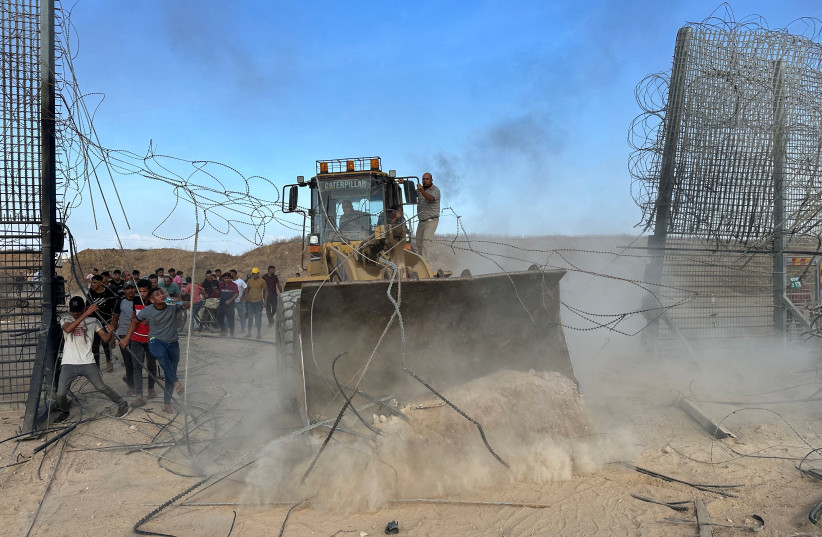For six months, we Israelis have been living with the shock of the October 7 Hamas attack. It has been difficult to purge the implausibility of that day from our minds, to reframe the belief systems it shattered. It has felt impossible to move forward, as long as our soldiers are still fighting and our hostages remain in captivity.
But now that we have arrived at Passover, the festival of freedom and spring, with its hope of new beginnings, it seems natural to want to clear the fog, to push back against the inertia. Doing so requires us to take a sober look at the new truths October 7 laid bare, before we can dislodge our old convictions, and formulate a new outlook.
As the Israelites celebrated their safe crossing of the Sea of Reeds with a song/poem, Shirat HaYam, we might use a poem as a guide for moving through the narrow place in which we find ourselves. The Plain Sense of Things by American modernist poet Wallace Stevens, seems to speak directly to this moment. It begins with the observation:
After the leaves have fallen, we return
To a plain sense of things.

After all we endured on October 7, and all we have experienced since, we have arrived at a place in which the ordinary, the essential, the previously hidden, have been exposed. It is a place of potential clarity, an invitation to see things as they are, in order to see them anew.
Beholding the “plain sense of things” may be painful. Our guiding principles may now appear to have been misguided. Our attitudes toward the future may seem to have been erroneously optimistic. Sadly, we are no longer who we once thought we were. As Stevens describes it:
The great structure has become a minor house.
No turban walks across the lessened floors.
We must also look back if we hope to construct a workable worldview out of this “plain sense of things.”
We must consider our past mistakes and failed best efforts, because, in Stevens’s words:
The greenhouse never so badly needed paint.
The chimney is fifty years old and slants to one side.
A fantastic effort has failed, a repetition
In a repetitiousness of men and flies.
This is an arduous process. But Stevens reminds us that it is essential, for without it, there can be no imagination, and without imagination, there can be no life:
It is as if
We had come to an end of the imagination,
Inanimate in an inert savoir.
We have arrived at the bleak moment Stevens’s poem anticipates. Over months and years, our leaders chose to see what they wanted to see. Their partiality imperiled the vital world of imaginative possibility, leaving us idle and inattentive. October 7 was a tragic consequence.
But Stevens offers hope. He suggests that keen observation can rekindle our imagination, and that human beings are intrinsically imaginative, after all, the absence of the imagination had itself to be imagined:
The great pond,
The plain sense of it, without reflections, leaves,
Mud, water like dirty glass…
He reminds us that after fall and winter, spring inevitably returns. May we all experience the Festival of Spring as the beginning of a period of renewed creativity.
The Plain Sense of Things
By Wallace Stevens (1879-1955)
After the leaves have fallen, we return
To a plain sense of things. It is as if
We had come to an end of the imagination,
Inanimate in an inert savoir.
It is difficult even to choose the adjective
For this blank cold, this sadness without cause.
The great structure has become a minor house.
No turban walks across the lessened floors.
The greenhouse never so badly needed paint.
The chimney is fifty years old and slants to one side.
A fantastic effort has failed, a repetition
In a repetitiousness of men and flies.
Yet the absence of the imagination had
Itself to be imagined. The great pond,
The plain sense of it, without reflections, leaves,
Mud, water like dirty glass, expressing silence
Of a sort, silence of a rat come out to see,
The great pond and its waste of the lilies, all this
Had to be imagined as an inevitable knowledge,
Required, as a necessity requires.
Wallace Stevens, “The Plain Sense of Things” from The Collected Poems of Wallace Stevens (Alfred A. Knopf, 1954). Copyright © 1954 by Wallace Stevens, renewed 1982 by Holly Stevens.
Sheryl Abbey is a Jerusalem writer and poet. She writes a weekly Substack, A Sense of Israel, and published the poetry collection, Along the Edge of Absence.
